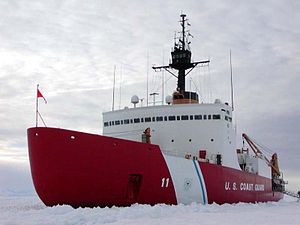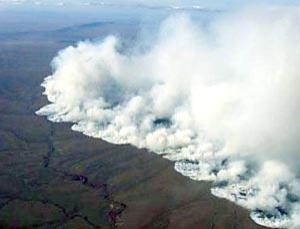|
|
|
|
|
|
|
|
No Arctic science events are scheduled today.
|
National Academies releases new report today "Acquisition and   Operation of Polar Icebreakers: Fulfilling the Nation's Needs." Operation of Polar Icebreakers: Fulfilling the Nation's Needs." A committee on Polar Icebreaker Cost Assessment released a letter report today that advises the U.S. Congress on strategies to minimize life-cycle costs of polar icebreaker acquisition and operations. The Committee recommends the number and type of polar icebreakers to fund and an acquisition strategy that achieves a lower cost. The Committee developed an independent cost estimate using available concept designs to determine if the U.S. Coast Guard's existing cost estimates for heavy and medium icebreakers are reasonable. It also compared operating costs of the current fleet to the prospective operating costs of new vessels. The Committee recommends a science-ready design for the new icebreakers and the use of an enhanced maintenance program to ensure continuity of operations for existing icebreakers. View the report here. The press release is here.
'The Permafrost is Dying': Bethel Sees Increased Shifting of Roads and Buildings. Along the main thoroughfare here, drivers brake for warped asphalt. Houses sink unevenly into the ground. Walls crack and doors stick. Utility poles tilt, sometimes at alarming angles. Permafrost in and around Bethel is deteriorating and shrinking, even more quickly than most places in Alaska. Since the first buildings out here, people have struggled with the freeze and thaw of the soils above the permafrost. Now those challenges are amplified. Alaska Dispatch News
In Northwest Arctic, a Powerful Tool in Combating Suicide: Training Youths to Help Each Other. Last month, the University of Alaska Fairbanks announced a $4.25 million initiative to tackle youth suicide in Alaska Native communities, with a focus on resilience and solutions. But one program in the Northwest Arctic Borough School District has focused on this type of community-based prevention since its start in 2008, and it now has been showing results. Promoting peer-to-peer mentoring, the school district's Youth Leaders Program engages students and their communities, challenging them to come up with solutions to bullying, isolation and suicidal tendencies. Alaska Dispatch News
 Fulbright Arctic Initiative Accepting Applications Fulbright Arctic Initiative Accepting Applications The U.S. Department of State has announced the launch of the second Fulbright Arctic Initiative. Scholars and researchers from the eight Arctic Council countries can now apply for this 18-month collaborative research program, which will begin in spring 2018 and run through the fall of 2019. Established researchers, early-career specialists, and indigenous knowledge experts will join together to form a network of scholars to conduct research in one of two focus areas: Resilient Communities and Sustainable Economies. Scholars will be selected through an open, merit-based competition to participate in an individual Fulbright exchange and convene with the other scholars for three in-person group seminars and on-going virtual communication to carry out team-based research. For more information, visit the Fulbright Arctic Initiative website or contact us.
Military Collects 1,100 tons of Scrap Metal in the Arctic. Russian Defense Ministry environmental cleanup units have completed over 25 percent of their 2017 plan to remove waste from the Arctic, according to the ministry's website. About 1,100 tons of scrap metal has been collected so far. Northern Fleet, the Central and Eastern military districts, and the Defense Ministry's 12th Main Directorate all have personnel involved in the efforts. This year, the cleaning of the area around military units, barracks, and training grounds in the Arctic is taking place on the Novaya Zemlya Archipelago (the Belushya Guba, Rogachyovo and Severny villages), the New Siberian Islands (Kotelny and Kildin islands) and several other locations. The Arctic
 How Climate Change is Spurring Wildfires in Alaska and NWT. How Climate Change is Spurring Wildfires in Alaska and NWT. Shortly after midnight on June 22, 2015, lightning struck along Alaska's Elliott Highway, 48km (30 miles) northwest of Fairbanks, igniting black spruce forests and tinder-dry grasses. The Aggie Creek Fire, as it was later called, would go on to burn for more than two months, scorching some 12,100 hectares (30,000 acres) and threatening the state's Alyeska oil pipeline. By the end of 2015, more than 2.06 million hectares (5.1 million acres) had burned in 770 fires across Alaska, an area roughly the size of Connecticut and second to only 2004's record-breaking 2.67 million hectares (6.6 million acres). In 2014, Northwest Territories saw the worst fire season since 1975, when 385 fires burned 3.4 million hectares (8.4million acres) in the Canadian territory. The majority of fires in the North are started by lightning - not humans, as is the case in the lower 48 states. In the hot summer months, it's not unheard of for more than 2,000 lightning strikes to hit Alaska's lowlands in a single day. News Deeply
Shipping Companies Urged to Stop Using Dirty Fuels in the Arctic. Shipping companies are under pressure to phase out use of heavy fuels ahead of a potential ban on their use in the Arctic in the coming years. The International Maritime Organization has approved an environmental review of the use of heavy fuel oil (HFO) by ships in the Arctic. Already banned in Antarctica, HFO is a dense and viscous byproduct of other fuel refining processes. Oil spills or leaks would be severely toxic, and devastating to flora, fauna and indigenous communities because of the long time the sludge takes to break down in cold water. The risks to fragile Arctic ecosystems could soar as more polar sea lanes become accessible because of climate change. The Guardian
|
|
Future Events
107th Commission Meeting of the US Arctic Research Commission. July 17, 2017(Washington, DC USA). The U.S. Arctic Research Commission will hold its 107th meeting in Washington, DC, on July 17, 2017. The business sessions, open to the public, will convene at 8:30 am at the Naval Heritage Center, 801 Pennsylvania Avenue, NW, Washington, DC 20004. The focus of this meeting will include reports and updates on programs and research projects affecting Alaska and the greater Arctic. Meeting agenda now online
IARPC Collaborations Webinar Series: Outcomes of Arctic Horizons, July 17, 2017, 1:30pm US Eastern Time. The Arctic Horizons project brought together members of the Arctic social science research and indigenous communities through a series of workshops to reassess the goals, potentials, and needs of these diverse communities and NSF's Arctic Social Sciences Program within the context of a rapidly changing circumpolar North. The Arctic Horizon's Program Manager and Principal Investigators will describe the outcomes of the workshop series, including the soon to be released final synthesis report which will describe the community's vision for the future of Arctic social science research. Go to: www.iarpccollaborations.org/webinars
(new this week)
This biennial symposium, co-hosted by U.S. National/Naval Ice Center (NIC) and the US Arctic Research Commission (USARC) focuses on a broad cross-section of naval and maritime operations and issues in an "ice-free Arctic." The symposium brings together nationally and internationally recognized experts on Arctic marine operations, infrastructure, science, environmental observations, and on a wide range of other topics.
Registration is CLOSED (capacity reached, sorry).
But you can still participate via the live webcast which will use the audience participation web app Sli.do. The link to the webcast will be provided here during the event.
The detailed program is available online here. Over 50 confirmed speakers, including:
 |
|  | Sen. Dan Sullivan |
|
|  | | Sen. Lisa Murkowski |  |
|
|  | | ADM P. Zukunft USCG |  |
|
|  | | Fran Ulmer USARC |  |
|
|  | | Larry Mayer USARC |  |
|
|  | | Sen. Angus King |  |
|
|  | | ADM Thad Allen USCG Ret. |  |
 |
|  | Marie Green USARC |
The movie Sea Blind will be shown, during the symposium's lunch break on Tuesday and Wednesday (July 18 and 19), and the filmmaker, Ms. Bernice Notenboom will be on hand for discussion and questions.
As the Symposium is organized jointly by two leading Research Institutes of Russian Academy of Science - Institute of Water Problems and Melnikov Permafrost Institute, particularly the contributions on following research topics are welcome:
- Observational evidences of change in coupled permafrost-hydrology system.
- Present state and future projections of local, regional and pan-Arctic hydrology.
- Modeling studies representing landscape evolution, dynamics of water storages and permafrost degradation.
- Impacts of permafrost hydrology changes on local communities.
VII International Conference on Cryopedology, August 21-25, 2017 (Yaktsk, Russia). The conference will be hosted by the Institute for Biological Problems of the Cryolithozone of the Siberian Branch of the Russian Academy of Sciences (SB RAS). Plenary reports will be organized in the hall of the Academy of Sciences of the Sakha (Yakutia) Republic. The official languages of the conference are English and Russian (with translation). All technical facilities (projectors, computers, video sets) will be available during the conference for presentation of papers. Additional information will be available soon. See the Facebook page here.
 2017 University of the Arctic Rectors' Forum and Conference, August 27-29, 2017 (Aberdeen, Scotland). This conference will also consider how northern scholarship can add to discussions on the North into broader terrains of intellectual engagement. In so doing, it will challenge dominant paradigms of research in both the natural and the social sciences, above all by calling into question the very separation of the world of nature from that of human society which underwrites the distinction between these two branches of scientific inquiry. In its place the conference will seek to forge a new practice of interdisciplinary research, done in collaboration with northern residents and on their terms, which recognizes that every discipline is itself an ongoing conversation, or a way of knowing, rather than a compartment within an overarching, hierarchically organized system of knowledge. Conversations from the North will, then, help to generate a science that is more open-ended, responsive to environmental variation and respectful of the wisdom of inhabitants. 2017 University of the Arctic Rectors' Forum and Conference, August 27-29, 2017 (Aberdeen, Scotland). This conference will also consider how northern scholarship can add to discussions on the North into broader terrains of intellectual engagement. In so doing, it will challenge dominant paradigms of research in both the natural and the social sciences, above all by calling into question the very separation of the world of nature from that of human society which underwrites the distinction between these two branches of scientific inquiry. In its place the conference will seek to forge a new practice of interdisciplinary research, done in collaboration with northern residents and on their terms, which recognizes that every discipline is itself an ongoing conversation, or a way of knowing, rather than a compartment within an overarching, hierarchically organized system of knowledge. Conversations from the North will, then, help to generate a science that is more open-ended, responsive to environmental variation and respectful of the wisdom of inhabitants.
- Small and off-grid community energy solutions
- Oil and gas development
- Renewable energy
- Regulation and Financing
- Transportation and transmission
The AES is a multi-disciplinary event expected to draw several hundred industry officials, scientists, academics, policy makers, energy professionals and community leaders together to collaborate and share leading approaches on Arctic energy issues.
2017 Arctic Circle Assembly, October 13-15, 2017 (Reykjavik, Iceland). The annual Arctic Circle Assembly is the largest annual international gathering on the Arctic, attended by more than 2000 participants from 50 countries. The Assembly is held every October at the Harpa Conference Center and Concert Hall and is attended by heads of states and governments, ministers, members of parliaments, officials, experts, scientists, entrepreneurs, business leaders, indigenous representatives, environmentalists, students, activists and others from the growing international community of partners and participants interested in the future of the Arctic.
 Polar Law Symposium 2017 and Rovaniemi Arctic Spirit, November 13-16, 2017 (Rovaniemi, Finland). The purpose of the Polar Law Symposium is to examine, in detail, the implications of the challenges faced by the Polar Regions for international law and policy and to make recommendations on appropriate actions by states, policy makers and other international actors to respond to these emerging and re-emerging challenges. The Rovaniemi Arctic Spirit Conference is integrated with the Polar Law Symposium, which will be organized by the Northern Institute for Environmental and Minority Law at the Arctic Center of the University of Lapland. Polar Law Symposium 2017 and Rovaniemi Arctic Spirit, November 13-16, 2017 (Rovaniemi, Finland). The purpose of the Polar Law Symposium is to examine, in detail, the implications of the challenges faced by the Polar Regions for international law and policy and to make recommendations on appropriate actions by states, policy makers and other international actors to respond to these emerging and re-emerging challenges. The Rovaniemi Arctic Spirit Conference is integrated with the Polar Law Symposium, which will be organized by the Northern Institute for Environmental and Minority Law at the Arctic Center of the University of Lapland.
ISAR-5 Fifth International Symposium on Arctic Research, January 15-18, 2018 (Tokyo, Japan). The fifth ISAR has been planned at the recommendation of the science steering committee of ISAR-4, which was held in Toyama, Japan in April 2015. The fifth ISAR will be devoted to discussions on environmental changes in the Arctic and their regional and global implications, to seek additional international scientific collaboration in this area by gathering, synthesizing and sharing information related to these changes occurring in the Arctic. Special emphasis will be placed on the fields of the social sciences and humanities, which were not included in the previous ISARs. ISAR-5 will consist of general sessions and special sessions. The general sessions will address the following topics: atmosphere; ocean and sea ice; rivers, lakes, permafrost, and snow cover; ice sheets, glaciers, and ice cores; terrestrial ecosystems; marine ecosystems; geospace; policies and economy; and social and cultural dimensions. Special sessions will be solicited on cross-cutting themes.
The Effects of Climate Change on the World's Oceans, June 4-8, 2018 (Washington, DC USA).
The 4th International Symposium will bring together experts from around the world to better understand climate impacts on ocean ecosystems - and how to respond. The event is hosted by a variety of groups including International Council for the Exploration of the Sea (ICES), North Pacific Marine Science Organization (PICES), Intergovernmental Oceanographic Commission of UNESCO (IOC), and Food and Agriculture Organization of the United Nations (FAO).
 POLAR 2018, June 15-27, 2018 (Davos, Switzerland). POLAR2018 is a joint event from the Scientific Committee on Antarctic Research (SCAR) and the International Arctic Science Committee (IASC). The SCAR meetings, the ASSW and the Open Science Conference will be hosted by the Swiss Federal Institute for Forest, Snow and Landscape Research WSL under the patronage of the Swiss Committee on Polar and High Altitude Research. The WSL Institute for Snow and Avalanche Research SLF is organizing POLAR2018. POLAR 2018, June 15-27, 2018 (Davos, Switzerland). POLAR2018 is a joint event from the Scientific Committee on Antarctic Research (SCAR) and the International Arctic Science Committee (IASC). The SCAR meetings, the ASSW and the Open Science Conference will be hosted by the Swiss Federal Institute for Forest, Snow and Landscape Research WSL under the patronage of the Swiss Committee on Polar and High Altitude Research. The WSL Institute for Snow and Avalanche Research SLF is organizing POLAR2018.
Arctic Biodiversity Congress, October 9-11, 2018 (Rovaniemi, Finland). The second Arctic Biodiversity Congress is hosted by the Conservation of Arctic Flora and Fauna (CAFF), the biodiversity working group of the Arctic Council, and the Ministry of the Environment, Finland. The second Arctic Biodiversity Congress will build on the success of the first Congress, held in 2014 in Trondheim, Norway, and will bring together scientists, policymakers government officials, Indigenous representatives, Traditional Knowledge holders, industry, non-governmental organizations, and others to promote the conservation and sustainable use of Arctic biodiversity.
|
|

  
4350 N. Fairfax Drive, Suite 510
Arlington, VA 22203, USA
External links in this publication, and on the USARC's World Wide Web site ( www.arctic.gov) do not constitute endorsement by the US Arctic Research Commission of external Web sites or the information, products or services contained therein. For other than authorized activities, the USARC does not exercise any editorial control over the information you may find at these locations. These links are provided consistent with the stated purpose of this newsletter and the USARC Web site.
|
|
|
|
|
|
|
|
|